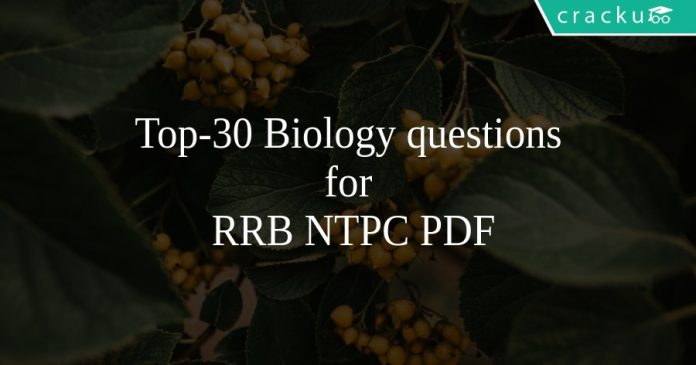Top-30 Biology questions for RRB NTPC PDF
Download RRB NTPC Top-30 Biology questions PDF. Questions based on asked questions in previous exam papers very important for the Railway NTPC exam.
Download Top-30 Biology questions for RRB NTPC PDF
Take a free mock test for RRB NTPC
Download RRB NTPC Previous Papers PDF
Question 1: The normal temperature of human being on Kelvin scale is-
a) 290
b) 310
c) 300
d) 305
Question 2: Allantois of Embryo helps in
a) digestion
b) respiration
c) excretion
d) protection
Question 3: Name the branch of Zoology that deals with the scientific study of animal
behaviour.
a) Ecology
b) Physiology
c) Ethology
d) Anatomy
Question 4: What does “Corpus luteum” secrete ?
a) Progesterone
b) Testosterone
c) Estrogen
d) Haemoglobin
Question 5: The male sex hormone is
a) Progesterone
b) Estrogen
c) Testosterone
d) Insulin
Question 6: Membrane lipids of chill-sensitive plants contain
a) low proportion of saturated fatty acids.
b) low proportion of unsaturated fatty acids.
c) equal proportion of saturated and unsaturated fatty acids.
d) high proportion of unsaturated fatty acids.
Question 7: Which one of the following animals is devoid of lateral line sense organ?
a) Labeo
b) Catla
c) Sea horse
d) Magur
Question 8: Emulsification is
a) breaking fats into small globules
b) digestion of fats
c) absorption of fats
d) storage of fats
Question 9: The animal who can consume more salt among the following is
a) Sheep
b) Camel
c) Donkey
d) Dog
Question 10: DPT vaccine is administered to prevent diseases like:
a) Diphtheria, Pertussis and Tetanus
b) Dengue, Pertussis and Typhoid
c) Dengue, Polio and Tetanus
d) Diphtheria, Pertussis and Typhoid
Question 11: Hypothermia occurs due to loss of excessive heat from body due to sudden low body temperature in:
a) Frogs
b) Human beings
c) Lizards
d) Snakes
Question 12: The primary producer in an ecosystem are;
a) Women
b) Men
c) Plants
d) Bacteria
Question 13: Liver is a RICH source of :
a) sugars
b) fat soluble vitamins
c) minerals
d) proteins
Question 14: The animal that do not develop hypertension in spite of heavy intake of salt is:
a) Sheep
b) Buffalo
c) Tiger
d) Camel
Question 15: A molecule in plants comparable to haemoglobin in animals is
a) Cytochrome
b) Cellulose
c) Chlorophyll
d) Carotene
Question 16: The cuticle is absent in
a) Leaf
b) Stem
c) Root
d) Fruit
Question 17: Which of the following pairs is correctly matched ?
a) Vitamin-A : Scurvy
b) Vitamin-B : Rickets
c) Vitamin-C: Nightblindness
d) Vitamin-E : Reproduction
Question 18: Which of the following statements is true ?
a) Animals worry about raising their family
b) Animals make several feeding trips in a day
c) Animals often behave sensibly
d) Animals do not know meaning of brotherhood
Question 19: The type of fruit obtained from a multicarpillary, apocarpous gynoecium is:
a) composite
b) aggregate
c) simple
d) multiple
Question 20: If all the plants of the world dies, all the animals would also die due to shortage of
a) Cold air
b) Food
c) Oxygen
d) Shelter
RRB NTPC Previous Papers [Download PDF]
Download General Science Notes PDF
Question 21: Saliva helps in the digestion of :
a) Fats
b) Starch
c) Proteins
d) Vitamins
Question 22: The longest bone in the human body is :
a) Ulna
b) Humerus
c) Femur
d) Tibia
Question 23: An example of false fruit is
a) Apple
b) Guava
c) Mango
d) Tomato
Question 24: The organisms at the base of the grazing foodchain are
a) Carnivores
b) Decomposers
c) Producers
d) Herbivores
Question 25: Vitamin A is rich in
a) Carrot
b) Lime
c) Beans
d) Rice
Question 26: The sweet taste of fruits is due to
a) Lactose
b) Fructose
c) Maltose
d) Ribose
Question 27: A molecule in plants comparable to haemoglobin in animals is
a) Cytochrome
b) Cellulose
c) Chlorophyll
d) Carotene
Question 28: Membrane lipids of chill-sensitive plants contain
a) low proportion of saturated fatty acids.
b) low proportion of unsaturated fatty acids.
c) equal proportion of saturated and unsaturated fatty acids.
d) high proportion of unsaturated fatty acids.
Question 29: The pigment that protect plants from harmful effect of ultraviolet rays is
a) Chlorophyll
b) Carotenoid
c) Phycocyanin
d) Plastid
Question 30: Our bones and teeth are generally made of-
a) Tricalcium Phosphate
b) Fluropettie
c) Chloropettie
d) Hydrollith
DOWNLOAD APP FOR RRB FREE MOCKS
Answers & Solutions:
1) Answer (B)
The temperature of the human body is 37 degrees Celcius which is equal to 37 + 273 = 310 K
2) Answer (C)
3) Answer (C)
4) Answer (A)
5) Answer (C)
6) Answer (D)
7) Answer (C)
8) Answer (A)
9) Answer (B)
10) Answer (A)
11) Answer (B)
12) Answer (C)
13) Answer (D)
14) Answer (D)
15) Answer (C)
16) Answer (C)
17) Answer (D)
18) Answer (B)
19) Answer (B)
20) Answer (B)
21) Answer (B)
22) Answer (C)
23) Answer (A)
24) Answer (C)
25) Answer (A)
26) Answer (B)
27) Answer (C)
28) Answer (D)
29) Answer (C)
30) Answer (A)
DOWNLOAD APP FOR RRB FREE MOCKS
We hope this Top-30 Biology questions PDF for RRB NTPC exam will be highly useful for your Preparation.





